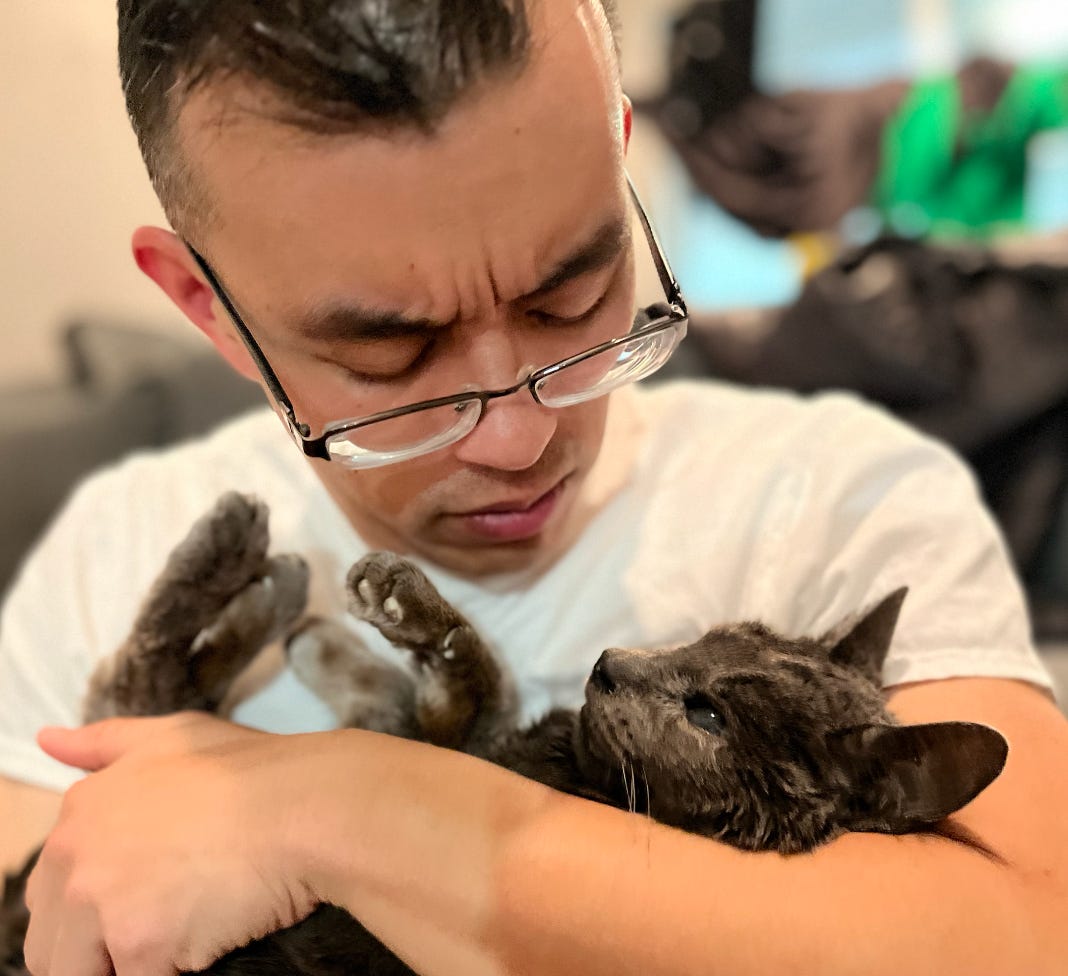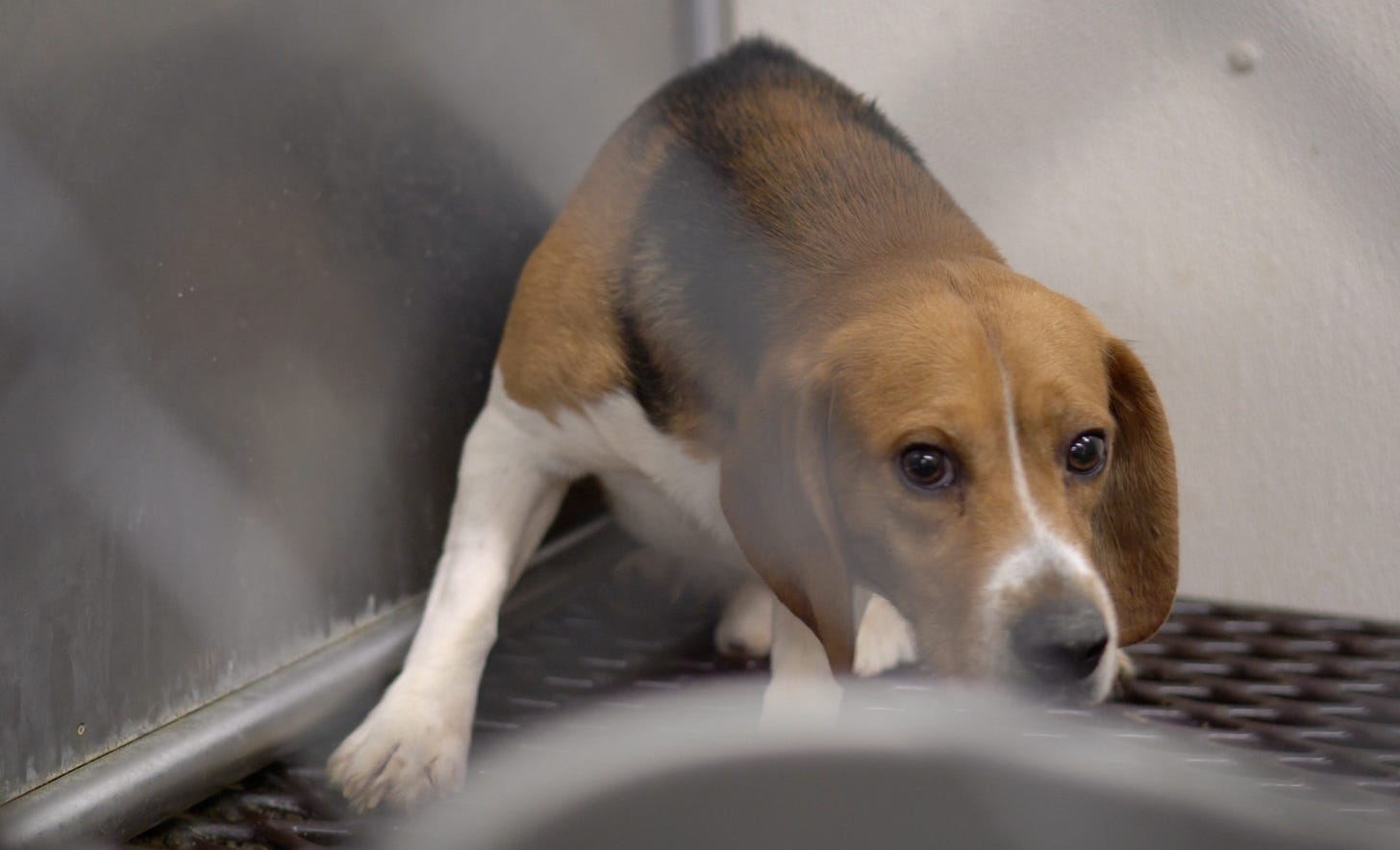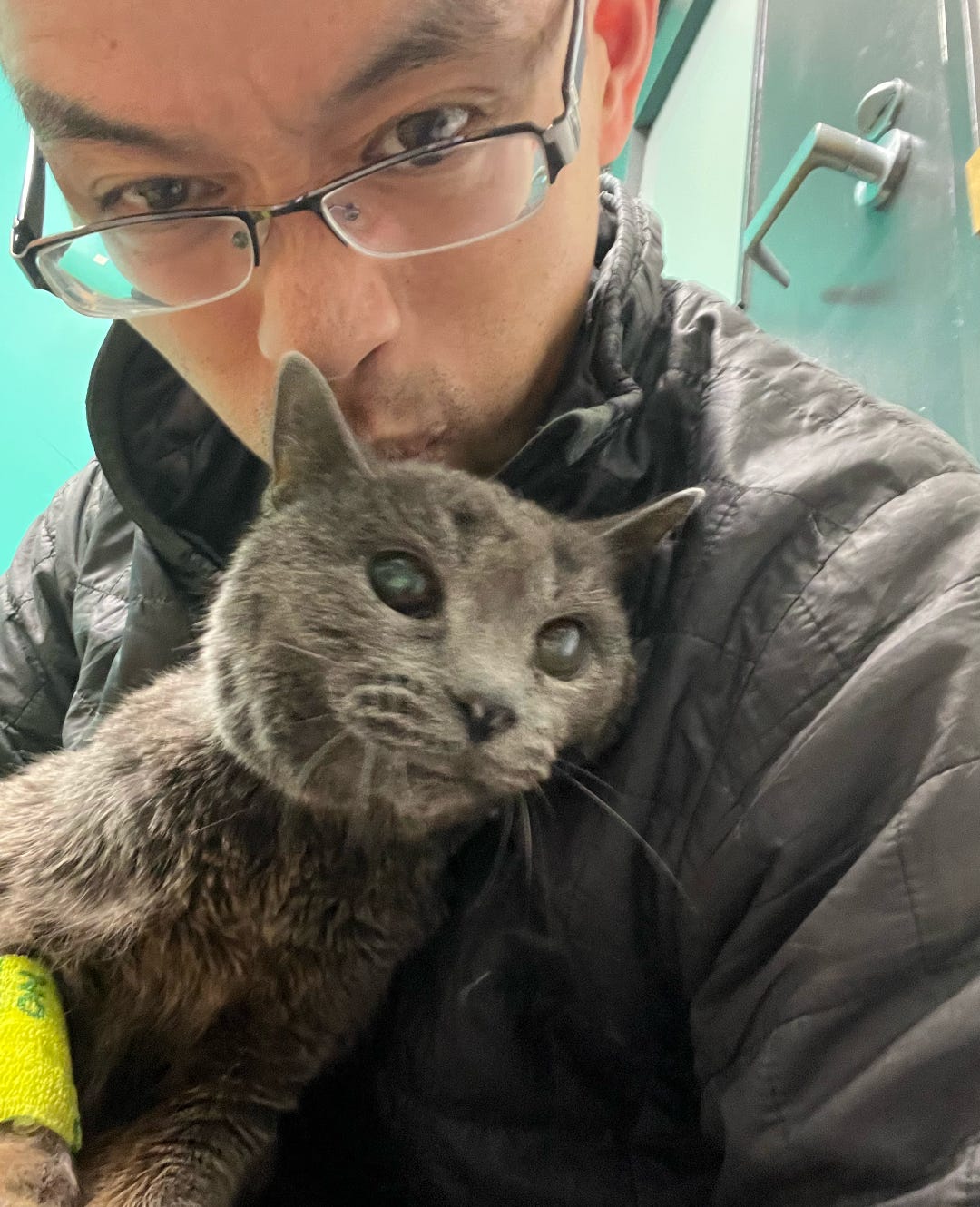How The Tide Is Turning On Animal Cruelty
Two moments last year broke me. But they also gave me hope.
The year 2023 was one of the worst of my life.
I was convicted of felony conspiracy in a trial where I was unconstitutionally gagged from speaking to the media and prohibited from presenting evidence of animal cruelty. My legal team nearly fell apart in the face of bizarre allegations that I was preying on women by getting them into criminal cases with me. I spent 38 days in jail and was released only to have my closest friends taken away.
But there were two moments in 2023 that hurt the most.
The first was the loss of the person who’s spent more time with me than anyone else in my life: Joan the Brave. For nearly two decades, Joan greeted me at my door with his big, curious eyes.
“What’s that?” he’d say. I’d often bring home animals in boxes and crates — orphaned squirrels, bloody pigeons, even delirious parrots. Joan would stare up at me. “Let me see!”
“Watch out,” I’d warn. “This one is 5 times your size. And has a sharp beak!”
But Joan never seemed to care. He’d walk right up to the strange creatures as if they were old friends. He didn’t even mind when they pooped in his face!
No matter how hard things got, I could count on Joan. He was my partner in rescue. Losing him to a pancreatic infection on February 24 was one of the hardest moments of my life. And nearly one year after his death, I still reflexively look down when I get home, expecting to scoop the little guy up in my arms.
Joan’s gone, I have to remind myself. And so are his big, curious eyes.
The second difficult moment of 2023 might be more surprising: watching the movie Guardians of the Galaxy 3. The Guardians series, one of the biggest blockbusters in Marvel cinema history, is not known for its emotional depth. To the contrary, it’s filled with nipple jokes and inappropriate dance-offs and intergalactic pirates confusing themselves with Mary Poppins.
But something happens in the first minute of the new Guardians movie that left me holding back tears: We see into the eyes of Rocket, a baby raccoon trapped in an animal experimentation facility.
The villain in the movie, the High Evolutionary, is a genius who tortures animals like Rocket for “the greater good.” He believes that the possibility of scientific breakthroughs justifies his experiments. And when, after a brutal surgical procedure (that mercifully takes place off-screen), Rocket develops the ability to speak and an Einstein-level intellect, the High Evolutionary believes he’s been vindicated.
“Anything I've done, I've done for the betterment of the universe,” he says. He instructs his staff to remove Rocket’s brain for further study and then dispose of Rocket and all the other animals by incineration.
For all his genius, the High Evolutionary doesn’t see the obvious flaw in his logic: Rocket is a person, too, and the universe can’t become “better” if we ignore the interests of those we trample in the name of progress. Everyone in the audience understands this from looking into Rocket’s eyes. They are not the eyes of an empty vessel. They are the eyes of a being who is conscious, and desperate for love and safety.
The opening scene, like others in the movie, is a powerful one. Still, I wasn’t quite sure why Guardians 3 hit me so hard. After all, I’ve seen unfathomable real-world suffering; why was this fictional story causing me so much pain? Perhaps, I thought, it’s because Rocket’s eyes reminded me of Joan, whom I had lost just a few months before seeing the movie.

Perhaps it was due to the narrative skill of director James Gunn and his crew, who don’t just deploy world-class CGI but use music so well that the movie feels as much like a song as a film. Guardians 3 opens with Radiohead’s Creep, and the song’s words echo with metaphorical significance:
When you were here before
I couldn’t look you in the eye.
But I suspect that the real reason I could not shake Guardians 3 is that, unlike most members of the audience, I knew it was not a fantasy. To the contrary, the story of the movie is unfolding in real life.
Take, for example, the High Evolutionary’s plans to kill Rocket in order to extract his brain. This is standard practice in real-world experiments on animals that require tissue sampling, including procedures performed on raccoons and dogs. The lab can’t wait for an animal to die a natural death, or the tissues could be ruined. So the animal is killed immediately after the experiment and the organ removed. Decapitation or exsanguination, i.e., draining the animal of blood, are two of the most common ways to do the deed. And, across the nation, tens of thousands of dogs, rabbits, rats, and other sentient beings cower as they await this fate. I have seen the fear in their eyes. And after looking into their eyes, I’ve never been the same.

For weeks after Guardians 3, I had flashbacks to experiences I’ve had in real life and to scenes from the movie. My subconscious mixed the two in nightmares that woke me, screaming, in the middle of the night.
Looking into their eyes
But here is the second surprise. Despite my night terrors, Guardians 3 was one of my greatest sources of hope in 2023. Because I learned something important from the movie, and from the loss of Joan, too:
I am not the only one who has chosen to look into their eyes — and been changed.
I have been surprised, for example, by the number of non-vegans in my life who reached out, after hearing Joan’s story, to share that they had felt similar pain. The loss of a “pet,” in today’s world, is increasingly perceived as something akin to the loss of a child.
And it was not just animal rights activists who responded to Rocket’s suffering. The New York Times’ review is representative. The cruelty to animals in the film, the Times writes, is “merciless” and almost made the movie too difficult to watch. But millions of people across the nation watched it nonetheless — it was the fourth most popular movie of 2023 — and there was extensive coverage of the animal rights themes. Take this piece from Vox:
After three films, it turns out that it’s Rocket, not [Chris] Pratt’s bro-hero Peter Quill, who is the true protagonist of the Guardians series. Rocket, [director James] Gunn told USA Today, was “created by somebody who didn’t care for him at all, didn’t have any of his own interests in mind.” His is the story of a being who began as someone’s tool, only to reclaim his personhood, in the fullest sense, with the help of a surrogate family who saw him for what he was.
Rocket’s story, beloved by millions, is the story of animal personhood. It shows that the public is finally looking into the animals’ eyes and seeing them for who they are: not empty vessels but persons capable of fear and love.
And with this new knowledge, the world will never be the same.
There is data to back this up. For the last two decades, Gallup has been doing a poll on attitudes toward medical testing on animals — perhaps the most controversial topic in animal advocacy. Animal rights legend Peter Singer, for example, has argued that some experiments may be justified if they have clear medical benefits. And, indeed, 60% of the public believe that animal testing is necessary to protect human health and life; 69% say it’s necessary for scientific progress.
Yet, despite the perceived benefits to human beings from animal testing, earlier in 2023, for the first time in history, Gallup found that the percentage of Americans who say medical testing on animals is “morally wrong” (48%) is now equal to those who deem it morally acceptable! Indeed, a simple linear projection of the current trend shows that, within 25 years, over two thirds of Americans will be morally opposed to medical testing on animals.
As I’ve written previously, there is similar data on other animal issues, including factory farming. A prominent non-animal think tank, Data for Progress, has found that 80% of Americans believe that farm animal cruelty is a personal moral concern. And this concern is turning into opposition to the status quo. Take the Sentience Institute’s most recent polling: Around 70% of people say they have discomfort with the way animals are used in the food industry while only 23% say they do not.
That 70% is much higher than the percentage of Americans who support stricter gun control laws (56%) or the Supreme Court decision on abortion in Roe v. Wade (62%).
In short, the pain I felt in 2023, from looking into the eyes of Rocket and Joan, was both difficult and real. But, increasingly, it is a pain that people across this nation share. Over time, that willingness to confront animal suffering will move our society irresistibly towards change.
From fear to hope
I recently wrote about what I described as the best idea I’ve ever had: the Law of Social Entropy, a universal force that drives society towards equality — and animal rights. One of the primary mechanisms behind this force is gaps in vulnerability. When highly vulnerable segments of society are also highly oppressed, it can trigger a vulnerability cascade that shakes the foundation of society, e.g., the Civil Rights Movement in the 1960s.
My two difficult moments in 2023 demonstrate how this mechanism can work for animal rights.
When people looked into Rocket’s eyes — or into the eyes of the desperate beagles we rescued from Ridglan Farms — they knew something was deeply wrong. To subject such gentle creatures to violence is a quintessential gap in vulnerability.
But by looking into another set of eyes — Joan’s eyes — we can see the solution. When Joan came into my life in late 2004, he was already an unflappable cat. But he had not yet known the power of love. Over the next 18 years, he felt that power. We felt it together. Even in his last moments on Earth, when everything in his body was failing him, Joan knew he still had me. He looked up at me, purring. He nuzzled my chest. And he felt safe and loved.
You can see it in his eyes.

That look, more than anything else, should give us hope at the end of 2023. Because when people look into Rocket’s eyes, and Joan’s too, they know which world they want. It’s not the High Evolutionary’s world. It’s Joan’s world.
And it’s a world shaped, not by cruelty and fear, but by love.
—
A few quick updates:
One day before the no-contact order went into effect, I did a podcast with Priya and fellow DxE co-founder Ronnie Rose. Check it out here, or find it on your favorite podcast app. (Just search “The Simple Heart.” Huge shout-out to Katherine and Chloe for helping so much with these podcasts!)
As the Ridglan trial approaches, we’ll be going back to a weekly schedule for this newsletter. Typically, we’ll publish on Thursdays, but this week we are publishing early because…
I’ll be on the East Coast this week! If you happen to be free during the day on Thursday, January 4 in New York City or on Saturday, January 6 in Washington DC, let me know. I’ll probably organize small gatherings on each day. I’d especially love to connect if you’re interested in helping out with the Ridglan trial. Reply to this email or contact info@simpleheart.org if you’re interested in joining.
I’ll also be speaking about the right to rescue at an event on Friday, January 5 at 2 pm in Washington, DC, as part of the Association of American Law School’s annual meeting. While I think you have to register for the entire conference to attend the panel, I’m sure I’ll end up hanging out with people afterwards at the hotel lobby. Come out if you can!
The Simple Heart is looking for help with two positions in San Francisco: Chief of Staff (paid) and podcast manager (volunteer). The former role, chief of staff, is a jack-of-all trades role that will help us ensure all operations at The Simple Heart are managed well as I dive back into trial. The application is here. The latter role, podcast manager, is a volunteer role that probably requires around 5 hours a week and some technical expertise. We need someone to help us set up the equipment, upload files for our editor, and manage the process of getting the podcasts posted. Send an email to info@simpleheart.org if you’re interested!






Wayne you are such an integral part of history for the welfare of animals. You are a true hero for them I have such respect for you and I know exactly how you feel . Just know that your Joan will be around you as there’s no such thing as death and life continues albeit on another plain. Your suffering will only make you stronger 🙏🏼💚
Dear Wayne,
best of luck for you and your endeavours. Your article about Rocket and your dear Joan I found truely heartbreaking.
Protecting animals is such a high and crucial moral thing to pursue, and I do wish you all the best. Like you, I do hope that activism and veganism are moves that can finally break the walls.
Best regards from Old Europe
Olaf